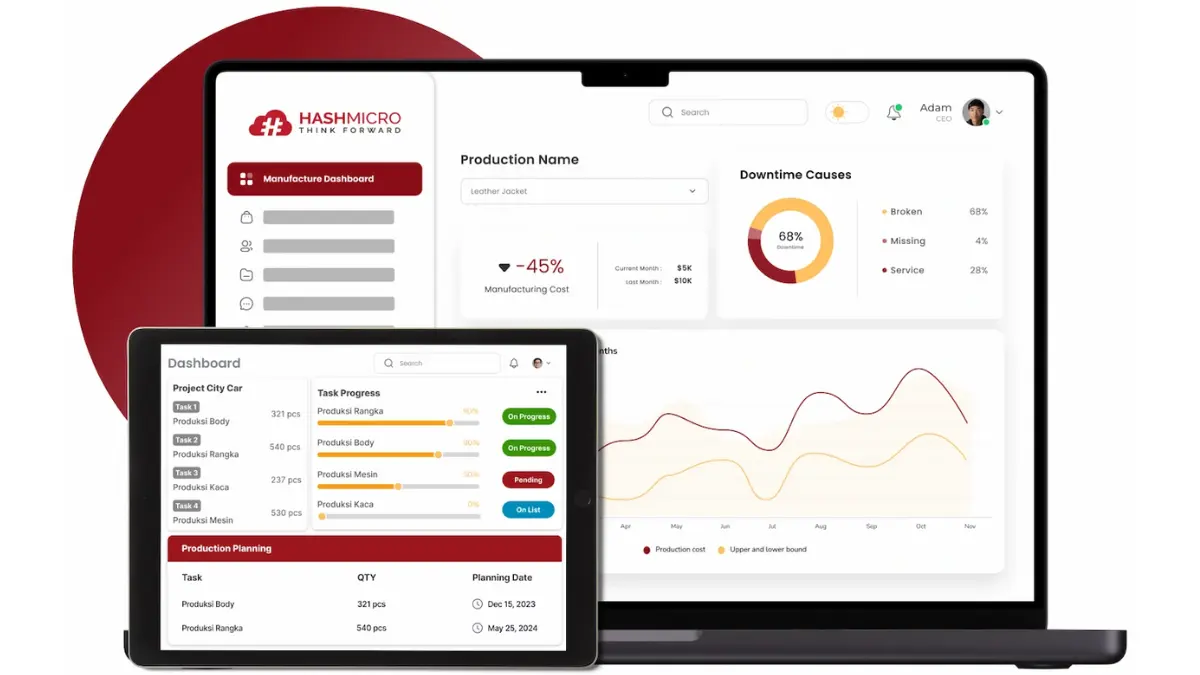In today’s fast-paced manufacturing environment, the pressure to optimize production efficiency and reduce costs is greater than ever. Discrete manufacturing, with its reliance on precise parts assembly, requires careful management to avoid production disruptions.
Challenges such as unexpected machine downtime, inventory management issues, and poor production planning can severely impact a company’s ability to meet deadlines and maintain product quality. These problems often result in higher costs and inefficiencies across the supply chain.
According to a report by the Philippine Statistics Authority, the manufacturing sector in the Philippines is one of the key contributors to the economy, but it faces challenges in automation and production efficiency. It’s estimated that 25% of local manufacturers still struggle with outdated systems, which negatively affect production timelines and profit margins.
In this article, we’ll dive into the world of discrete manufacturing and how HashMicro’s manufacturing software can help streamline operations, reduce downtime, and improve overall efficiency.
Table of Contents

Key Takeaways
|
What is Discrete Manufacturing?
Discrete manufacturing involves producing distinct, countable items like cars, furniture, and smartphones. Unlike continuous manufacturing, it focuses on creating individual products assembled from various components such as nuts, bolts, and wires.
This process can be flexible and complex, with some items produced in low volumes and high complexity, requiring adaptable systems to maintain quality. Others are made in higher volumes with simpler designs, focusing on inventory control, lead times, and waste reduction.
Discrete manufacturing systems allow for flexibility, with production processes that can start, stop, and adjust to different rates. By integrating discrete manufacturing software and ERP systems, businesses can enhance efficiency, streamline production, and gain better control over their operations.
Characteristics and Examples of Discrete Manufacturing
Discrete manufacturing is defined by a few key characteristics that help streamline the production process and ensure product quality. These characteristics include standardized materials, well-planned production stages, and proactive machinery maintenance.
Now that we’ve discussed these defining traits, let’s take a closer look at how they are applied across various industries that utilize discrete manufacturing processes.
-
Standardized materials
In discrete manufacturing, a Bill of Materials (BoM) is used to list all the raw materials, parts, and quantities required to create a product. The BoM must be regularly updated to reflect any changes in production processes or materials.
This ensures that production remains efficient and accurate. By maintaining a well-managed BoM, businesses can streamline their operations and reduce the risk of errors, making discrete manufacturing software and ERP systems essential tools in the process.
-
Production planning
Effective production planning outlines every step of the manufacturing process, from material preparation to final packaging. It includes decisions on whether products will be produced in large batches or customized orders.
Each item is tracked through unique serial numbers, ensuring traceability throughout the process. This structured approach helps companies maintain smooth workflows and improve production efficiency, particularly when using discrete manufacturing systems to manage operations.
-
Preventative machinery maintenance
To prevent costly downtime and ensure consistent quality, preventive machinery maintenance is crucial in discrete manufacturing. Companies implement maintenance policies that address potential machine failures before they happen.
Regular servicing and monitoring of equipment can reduce production delays and improve overall output. By utilizing discrete manufacturing ERP systems, businesses can schedule and track maintenance, optimizing machine uptime and minimizing disruptions.
Now that we’ve explored the key characteristics of discrete manufacturing, let’s look at some real-world examples that demonstrate how these principles are applied across various industries.
-
Aerospace & defense
Aerospace and defense manufacturing is a prime example of discrete manufacturing, where custom parts are assembled into mission-specific components. Aerospace manufacturing often involves large-scale assembly lines designed to accommodate highly specialized components.
Each part is meticulously crafted to meet strict quality and safety standards. Discrete manufacturing software plays a critical role in managing complex assembly processes and ensuring compliance with industry regulations.
-
Automotive
Automotive manufacturers use a multistage assembly process, where each stage is connected yet distinct, highlighting the discrete nature of the industry. The production process includes various stages such as parts assembly, painting, and final inspection, each with its timeline and requirements.
This makes it crucial to have robust discrete manufacturing systems in place to coordinate the flow of materials and ensure quality across all stages of production. The flexibility and precision required in automotive manufacturing benefit from an integrated discrete manufacturing ERP solution.
-
Electronics & appliances
Consumer electronics and appliance manufacturers are another excellent example of discrete manufacturing. These companies often use specialized sub-assembly cells to assemble precise components, like transistors and silicon chips, into final products.
Items like smartphones and kitchen equipment, which contain many easily disassembled parts, demonstrate the flexibility of discrete manufacturing. By employing discrete manufacturing software, these producers can efficiently manage the assembly of complex products and ensure quick repairs or replacements when necessary.
-
Industrial manufacturing & construction
Industrial manufacturing and construction industries use discrete manufacturing processes to produce heavy machinery and construction equipment. These industries require precision and the ability to customize components, making discrete manufacturing ERP essential for tracking complex workflows and meeting project specifications.
Discrete vs. Process Manufacturing
Discrete manufacturing involves assembling individual parts to create identifiable, countable products, such as in automotive or electronics. In contrast, process manufacturing blends raw materials using formulas or recipes, creating products like pharmaceuticals or beverages that cannot be broken down into their original components.
In discrete manufacturing, a Bill of Materials (BoM) guides production, often using an assembly line for efficiency. Process manufacturing, however, relies on recipes to refine ingredients in batches, emphasizing continuous or batch processing rather than discrete units.
Both manufacturing types require specialized systems to ensure efficiency. Discrete manufacturing software and ERP systems manage parts and assembly, while process manufacturing systems focus on ingredient tracking and batch scheduling.
Discrete Manufacturing and ERP Systems
ERP systems, initially known as Manufacturing Resource Planning, were developed to streamline and manage discrete manufacturing processes. These systems provide companies with greater control and visibility over their operations, reducing waste and production time.
Key functions in discrete manufacturing ERP systems include inventory management, sales order tracking, supply chain management, financial control, and CRM. By integrating these functions, businesses can efficiently manage their operations and improve overall performance.
These ERP systems are often tailored to meet the specific needs of industries such as automotive, aerospace, defense, industrial equipment, and electronics. Discrete manufacturing software is customized to ensure that the system aligns with the unique requirements of each manufacturer, optimizing production processes.
Industries that Use Discrete Manufacturing
Discrete manufacturing is essential for industries that focus on producing individually distinct products, where each item is identifiable and countable. From automotive to electronics, these industries rely on specialized systems to manage production processes efficiently and maintain product quality.
- Automotive industry: The automotive industry relies heavily on discrete manufacturing to produce distinct components such as engines, wheels, and body parts. Discrete manufacturing systems help manage complex assembly lines, ensuring efficiency and precision throughout production.
- Furniture manufacturing: Furniture production is a prime example of discrete manufacturing, where individual components like frames, cushions, and upholstery are assembled into finished products. Discrete manufacturing software helps streamline production processes, manage materials, and track inventory.
- Toys and recreation: In the toy industry, discrete manufacturing is used to create a variety of products, from dolls to remote-controlled cars. These companies benefit from discrete manufacturing ERP systems that ensure efficient production and quality control across different toy components.
- Tech and electronics: The tech and electronics sector often uses discrete manufacturing to assemble products like smartphones, computers, and other consumer electronics. These industries rely on discrete manufacturing systems to track parts and manage complex production workflows.
- Clothing and apparel: The clothing industry uses discrete manufacturing to produce individual garments, from fabric cutting to stitching and finishing. With the help of discrete manufacturing ERP, businesses can efficiently manage the production of various styles and sizes, ensuring timely delivery.
- Machinery manufacturing: Manufacturing machinery and heavy equipment relies on discrete manufacturing to create complex, high-precision products like industrial machines and construction equipment. Discrete manufacturing software supports the detailed tracking of parts and assembly processes in this highly technical sector.
Best Practices for Discrete Manufacturing Maintenance
Effective maintenance is crucial for keeping production running smoothly in discrete manufacturing. When machinery fails, even for a short time, it can lead to significant downtime and production delays, costing both time and money.
Here are some best practices that can help optimize maintenance processes and enhance the overall reliability of your manufacturing operations.
1. Scheduled preventative maintenance and operator-centric care
Routine maintenance, repair, and operations (MRO) checks help minimize the risk of unexpected downtime in discrete manufacturing. In addition to scheduled checks, it’s essential to train operators to perform quick inspections, make minor adjustments, and carry out daily tasks like lubricating key components.
This proactive approach ensures machines operate efficiently and reduces the risk of production halts. Discrete manufacturing software can assist in tracking maintenance schedules and tasks to keep operations on track.
2. Spare parts strategy
Having a well-defined spare parts strategy is crucial to minimizing downtime when a machine breaks down. Manufacturers should balance the need to keep critical spares on hand for high-wear components with the costs of maintaining excess inventory.
Alternatively, companies can implement vendor-managed inventory systems to adopt a just-in-time parts replacement strategy. Discrete manufacturing ERP systems can help manage inventory levels and ensure that necessary parts are available without overstocking.
3. Cross-functional collaboration
Encouraging regular communication and data sharing between production, maintenance, and engineering teams is key to identifying and addressing potential machine failures. By tracking production throughput, reject volumes, and machine performance, teams can pinpoint areas where maintenance may be needed.
This cross-functional collaboration enhances problem-solving and improves overall production efficiency. Discrete manufacturing systems can facilitate the exchange of real-time data, allowing teams to stay aligned and proactive in preventing breakdowns.
4. Continuous improvement
To maintain high-quality production and minimize machine failures, manufacturers should focus on continuous improvement practices. Implementing lean manufacturing techniques, like reducing waste and improving machine setups, is essential for maintaining optimal machine performance.
Additionally, leveraging discrete manufacturing ERP software allows businesses to analyze machine performance data and identify areas for improvement. By continuously refining processes and equipment, companies can achieve better cycle times and enhanced product quality.
Streamlining Discrete Manufacturing Management with HashMicro’s Advanced Software
Ang pamamahala ba ng iyong production workflow at quality control ay nagiging isang mabigat na gawain? Imagine a manufacturing environment where processes are seamlessly integrated, each product meticulously tracked, and production optimized in real-time.
That’s where HashMicro’s Manufacturing Software comes in. It transforms how your business operates by automating and streamlining every part of your production, from planning and material management to quality control.
By centralizing your operations and ensuring complete visibility into every component, you can eliminate manual errors, avoid bottlenecks, and provide timely order fulfillment, creating a smooth and efficient workflow throughout your discrete manufacturing process.
Here are the key features of HashMicro Manufacturing Software that enable precise, seamless production management:
- Manufacturing Production Scheduling: By forecasting production needs based on historical demand, this feature enables businesses to plan production schedules more accurately. The intuitive graph allows users to visualize the Manufacturing Production Schedule (MPS), leading to better decision-making, reduced overproduction, and optimized resource allocation.
- Secret Recipe / BoM: The Bill of Materials (BoM) system ensures that all raw materials, parts, and quantities are carefully tracked and managed throughout production. This streamlined management leads to fewer errors, improved cost control, and better production planning, ensuring high-quality end products.
- Manufacturing Quality Control: Quality control is integrated into every stage of the production process to detect and address potential issues before they reach the customer. This proactive approach leads to consistent product quality, fewer returns, and higher customer satisfaction.
- Conveyor Belt Sensor IoT Integration: By integrating IoT sensors into conveyor belts, this feature allows for real-time tracking of material movement and machine conditions. As a result, businesses can automate their processes, ensuring smoother operations, faster production, and fewer disruptions.
- OEE Tracking: Overall Equipment Effectiveness (OEE) tracking monitors the availability, performance, and quality of your equipment in real time. This enables businesses to identify inefficiencies, maximize machine productivity, and reduce unplanned downtime, leading to improved operational efficiency.
- Stock Requisition Based on Planned Production: This feature automates stock requisitions based on production schedules, ensuring that the right materials are available at the right time. By preventing stockouts and overstocking, companies can maintain a steady flow of production, improving cash flow and minimizing delays.
- Production Order & Work Order Tracking: Real-time tracking of production and work orders helps managers monitor progress and identify potential bottlenecks quickly. This transparency leads to better coordination, reduced lead times, and enhanced ability to meet production deadlines.
With HashMicro, you can turn your production management into a competitive advantage. Say goodbye to inefficiency and hello to streamlined, precise manufacturing, ready to scale and deliver with confidence.
Conclusion
Discrete manufacturing is a critical process for industries that produce distinct, countable products such as automobiles, electronics, and furniture. By focusing on the assembly of individual parts, this approach ensures precision and traceability throughout the production process.
However, managing the complexities of discrete manufacturing can be challenging without the right tools. HashMicro’s Manufacturing Software is designed to address these issues by automating end-to-end production. With its comprehensive features, you can optimize your production flow and improve efficiency across every stage of the manufacturing process.
Take the next step in transforming your manufacturing processes. Book a free demo of HashMicro’s Manufacturing Software today and see how it can enhance your business operations.

























